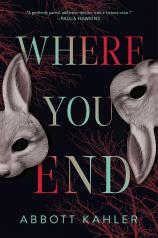Excerpt
Excerpt
Where You End

KAT: NOW
The Night of the Accident
MARCH 1983
It was just like me to go ahead and die, leaving her behind. That’s what I’d hear her say, if I could hear her at all. Foolish, careless, typical. Expected, even. Another instance in which she was forced to clean up my mess, tend to my mistakes. Her guillotine voice would curse me in the sweetest tones. She would softly rake her bloody fingernails against my lifeless arm. She would say all the right things to lure me back, and keep all the wrong things to herself.
On that night we left the old neighborhood just as the rain began to fall. I ran first—I’ve always gone first—leading her back the way we came: through a colony of dusty relics, across a lush runway of grass, down a street where the homes are crowded with ghosts. I was not right. There was a pulsing inside my head, the tempo and weight of a thousand percussive drums, but I convinced myself otherwise, let my mind talk me into believing my own lies.
As we set off, me behind the wheel and my twin sister by my side, the rain stopped and I felt a shivery relief. The clouds cleared and the full moon shot its light through the craggy branches, illuminating the road ahead.
I saw the deer’s body right before I swerved hard right, its long neck snapped unnaturally back. Then came a tree and a sheet of glass and the feeling that my head had launched away from my body, soaring into the sky, too far for me to retrieve it. I had time to form one last thought before my mind emptied itself of all things: She will know how to fix me.
JUDE: NOW
Hours after the Accident
MARCH 1983
Jude sits in the hospital waiting room, folding and unfolding her hands, her fingernails still stained with her sister’s blood. Kat has been wheeled off to some distant room but Jude can see her perfectly—a tangle of wires on her chest and a tube stabbing her throat and the nurses fluttering about like a flock of poisoned birds. A drop of sweat falls onto Kat’s cheek. Machines blink and hiss. Instruments maneuver and gleam. Her long, taut body is hidden beneath a sheet. She has lost all sense of herself. The light begins to dim behind her closed eyes and Jude watches it happen, an excruciating descent, a darkening by degrees.
Kat is leaving her.
Against Jude’s will, her body holds itself absolutely still; the only moving part is a ticker in her mind, tallying Kat’s absence. One second, two, ten. Jude’s brain pulses and her heart grows quiet, as though the two organs are trading places, confusing their functions. Thirty seconds, thirty-five. Her lips collapse into a severe blue slash, trapping her breath behind them. Eighty-nine, ninety. Her ears register a strident voice, telling her to come back and stay with him, stay with him, stay with him, that’s it, steady, steady, good …
“Miss,” the doctor says, grasping Jude’s arm. “Are you okay?”
Those interminable ninety seconds rewind. Her body frees itself. Her mind resumes being a mind and her heart a heart, racing and pounding as minds and hearts do. Her lips part and allow greedy gulps of breath. The waiting room shakes itself out and returns to its proper form: four dingy beige walls, a fake plant with dusty leaves, a tidy line of stackable fabric chairs, the sounds of coughing and weeping and the nightly news predicting nuclear war. The doctor squeezes Jude’s arm again and confirms what she already knows: Kat had been gone but now she is halfway back, alive but in a coma. He whispers a series of chilling words: traumatic brain injury, intercranial pressure, damaged axons. She will live but might never be the same. Jude should expect the worst. She should prepare.
* * *
All their lives they’ve compensated for each other, and now, with Kat lying still and silent and swathed in bloody ribbons, Jude begins to do the work of her twin’s brain. Kat must be wondering why it’s so dark behind her eyes, a dark deeper than sleep, and why the voices she hears seem so slushy and far away. Her arms itch where the needle has impaled her skin and she’s dying to scratch, but her other arm is weighted by something unseen. She is frustrated and scared and, above all, angry—why is she flattened and immobile instead of out in the world, raising a glass and toasting everything to come? She tries to rescue her voice, but the words stick in the grooves of her tongue. She is counting on Jude to bring her around, to restore her so that they are again a perfect whole.
“Kat,” Jude says, her mouth clamped to her sister’s ear, her lips fitting perfectly in the curves and folds, her voice aimed deep into the canal. “I know you hear me. You are not allowed to die. I will kill you if you die, and then where will we be? Do you want us to spend all of eternity haunting each other’s ghosts?”
Even under the bandages, Kat still looks like Jude—an opposite replica of her. Mirror image twins, they’re called. A heightened, italicized version of identical, when the embryo splits later than usual. Jude is right-handed and Kat favors her left. Their hair whorls push in different directions, Kat’s clockwise and Jude’s counter. Their voices, too, establish balance: Kat’s is frenzied and rushed, a freight train in danger of careening offtrack; Jude’s is measured and parsed, doled out in careful servings, as though in danger of drying up. The same purple vein snakes along opposing temples, pulsing when they are excited or angry or shocked. A birthmark on either shoulder, a deepened dimple on either cheek, one slightly elongated incisor on either side of their mouths. Kat always joked that they even pissed from complementary holes.
Kat is three minutes older, dominating their journey from the very start, but Jude has always felt responsible. It was Kat’s job to carve their path through life and Jude’s to concoct explanations and tidy any mistakes. Her brain continues to translate Kat’s thoughts, but they seem to be receding—not in frequency or intensity but in clarity. Jude can see it, a slow chalkboard erasing of people and places and events, leaving only outlines until they, too, are gone.
“Come back,” Jude whispers. “I beseech you. I order you. You know I know what’s best for us. You’ve always known it, even when you did what you wanted to do anyway. But this time you must do what I say, and do it now.”
Two weeks to the day that Kat died for ninety seconds, she finally obeys. Jude senses it happening before it actually does: the air around her warms, throwing off a charge of energy only Jude can feel. Jude rushes to her bedside. She presses her hand against Kat’s heart and feels the thump of its base; her own heart synchronizes its beats. She can see beyond Kat’s eyelids, her irises stirring, pupils dilating, light finally seeping to the other side.
Kat’s eyes spring open and stare directly into hers.
“Hello, Jude,” she says.
“Welcome back,” Jude tells her. She lowers her face to Kat’s, their noses touching. A single tear drops from Jude’s right eye into Kat’s left. Her breath flows into her sister’s mouth. “Welcome back and never leave me again.”
The doctor rushes in. He checks a tower of monitors, takes Kat’s hand, asks if she is able to answer questions. Does she know who she is? No. Does she know where she lives? No. Does she remember what she was doing before the accident? Does she remember the accident itself? No and no. Does she recall where she grew up, her parents’ names, the last job she held, where she went to school, her favorite hobbies? Negative to all of them. He conducts tests, consults with fellow experts, and concludes that Kat’s brain has changed in a fundamental and permanent way.
One thing becomes clear: Jude is all that she knows.
Jude understands that their lives have been split into two distinct wedges of time—before the accident and after the accident—and she alone will decide how the two should intersect, how much one should inform the other.
She will have to reconstruct her sister from the ground up. She will have to consider what it is like to wake up with a disintegrated brain, all nerves and synapses and pathways razed to the ground. Kat doesn’t know her name or age, her likes or dislikes, her style of humor, her favorite pastimes, the nightmares that infest her sleep. Her own history is silent and imageless, all triumphs and failures erased. She can’t remember if there were birthday parties and homecoming dances, if she’s ever been in love, if she’s ever sought revenge. She is ignorant of the topography of her own body, inside and out—how she got the scar along her arm, what opens and closes her heart.
It will fall upon Jude to tell her everything, to color in the outlines of her life. No one understands. No one has seen anything like it before. It is unprecedented, a medical mystery, an inexplicable quirk of twin connection.
Kat has been unmade, she thinks. And only I can remake her.
Copyright © 2024 by Abbott Kahler
Where You End
- Genres: Fiction, Psychological Suspense, Psychological Thriller, Suspense, Thriller
- hardcover: 336 pages
- Publisher: Henry Holt and Co.
- ISBN-10: 125087324X
- ISBN-13: 9781250873248


